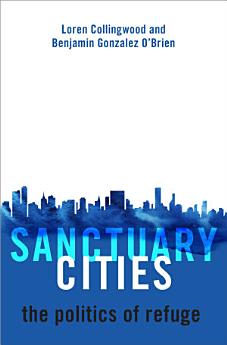Sanctuary Cities: The Politics of Refuge
Sep 2019 · Oxford University Press
1.0star
2 reviewsreport
Ebook
240
Pages
family_home
Eligible
info
reportRatings and reviews aren’t verified Learn More
About this ebook
The accidental shooting of Kathryn Steinle in July of 2015 by an undocumented immigrant ignited a firestorm of controversy around sanctuary cities, which are municipalities where officials are prohibited from inquiring into the immigration status of residents. Some decline immigration detainer requests from U.S. Immigration and Customs Enforcement. While sanctuary cities have been in existence since the 1980s, the Steinle shooting and the presidency of Donald Trump have brought them renewed attention and raised a number of questions. How have these policies evolved since the 1980s and how has the media framed them? Do sanctuary policies "breed crime" as some have argued, or do they help to politically incorporate immigrant populations? What do Americans think about sanctuary cities, and have their attitudes changed in recent years? How are states addressing the conflict between sanctuary cities and the federal government? In one of the first comprehensive examinations of sanctuary cities, Loren Collingwood and Benjamin Gonzalez O'Brien show that sanctuary policies have no discernible effect on crime rates; rather, anti-sanctuary state laws may undercut communities' trust in law enforcement. Indeed, sanctuary policies do have the potential to better incorporate immigrant populations into the larger city, with both Latino police force representation and Latino voter turnout increasing as a result. Despite this, public opinion on sanctuary cities remains sharply divided and has become intensely partisanized. Looking at public opinion data, media coverage, and the evolution of sanctuary policies from the 1980s to 2010s, the authors show that conservatives have increasingly drawn on anecdotal evidence to link violent crime to the larger debate about undocumented immigration. This has, in turn, provided them an electoral advantage among conservative voters who often see undocumented immigrants as a threat and has led to a push for anti-sanctuary policies in conservative states that effectively preempt local initiatives aimed at immigrant incorporation. Ultimately, this book finds that sanctuary cities provide important protection for immigrants, helping them to become part of the social and political fabric of the United States, with no empirical support for the negative consequences conservatives and anti-immigrant activists so often claim.
Ratings and reviews
1.0
2 reviews
EvilHates Truth
- Flag inappropriate
February 9, 2021
Accidental s h 0 0 ting yeah right what a bunch of propoganda catering to criminals more. Woe to those who call bad good and good bad.
A WHITEIsrealite And BROWNSareJealousOfUS
- Flag inappropriate
- Show review history
February 9, 2021
Read Deuteronomy32:8, romansl3.
About the author
Loren Collingwood is an Associate Professor in the Department of Political Science at University of California, Riverside. He is the author of Campaigning in a Racially Diversifying America: When and How Cross-Racial Electoral Mobilization Works, and more than 23 journal articles. His research and teaching interests include American politics, political behavior, immigration, race and ethnic politics, and political methodology. Benjamin Gonzalez O'Brien is an Assistant Professor of Political Science at San Diego State University. He is the author of Handcuffs and Chain Link: Criminalizing the Undocumented in America, as well as a number of articles on sanctuary policies, intergroup attitudes, and elections. His main research interests include American politics, immigration policy, racial and ethnic politics, and American political development.
Rate this ebook
Tell us what you think.
Reading information
Smartphones and tablets
Install the Google Play Books app for Android and iPad/iPhone. It syncs automatically with your account and allows you to read online or offline wherever you are.
Laptops and computers
You can listen to audiobooks purchased on Google Play using your computer's web browser.
eReaders and other devices
To read on e-ink devices like Kobo eReaders, you'll need to download a file and transfer it to your device. Follow the detailed Help Center instructions to transfer the files to supported eReaders.






